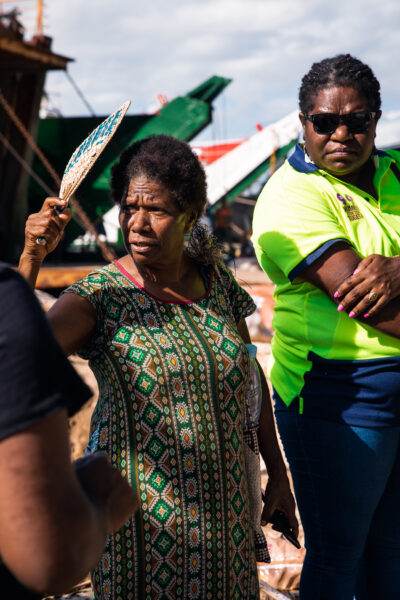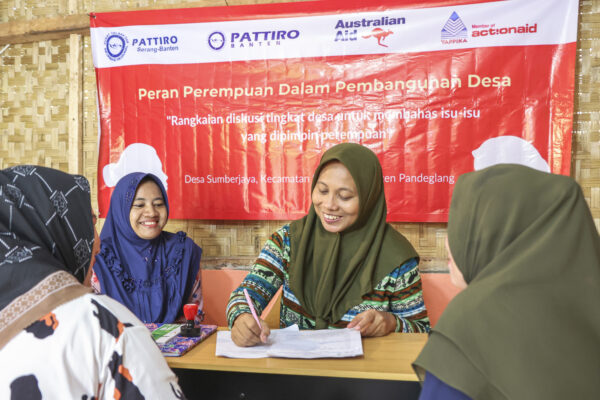This World Humanitarian Day, we are celebrating all the women who lead their communities in times of crisis.
Women are disproportionately affected during disasters and conflict, but no matter what, we are seeing women taking on the role of first responders during disasters time and time again, leading their communities and making sure no one is left behind.
Read on as we spotlight three women humanitarians protecting their communities and leading emergency responses.
Betina Charlie, Vanuatu
After Cyclone Pam devastated communities across Vanuatu in 2015, ActionAid established the Women I Tok Tok Tugeta Network (WITTT) – a Ni Vanuatu women led initiative that supports women to lead disaster responses and build their communities resilience to climate change. Over the last eight years, the WITTT Network has grown to include over 9000 women across five islands.

Betina Charlie preparing to distribute relief to communities impacted by the twin cyclones
Betina is the Ground Coordinator and President of the Women I Tok Tok Tugeta (WITTT) Network in Malo, Vanuatu. Betina, and the women of Malo, have been supported by ActionAid to lead responses to humanitarian emergencies. Through ActionAid-run women-led preparedness trainings, Betina has gained the tools and knowledge to support her family and community before, during and after disaster.
In March 2023, destructive Tropical Cyclones Judy and Kevin struck Vanuatu. While the island of Malo was not directly affected, the women of the WITTT Network initiated an emergency response to support other members on the islands of Efate and Tanna. They travelled by boat for two days to transport containers of food crop to those affected by the cyclones.
“Women all over Malo came together and contributed local food crops to respond to the affected southern provinces, Shefa and Tafea Province. We did something that surprised a Tanna chief as well, because he did not believe in this network. They said we were wasting time, but when the ladies from Malo got to Tanna with the relief foods, they received the Chiefs support and he said from now on they will work with ActionAid,” said Betina.
The leadership of the WITTT network in times of disaster has changed attitudes towards women’s role in humanitarian responses and advanced gender equality in communities across Vanuatu.
Roselyn Riopay, The Philippines
Meet Roselyn, a young rural leader and chairperson of PKKK (National Rural Women’s Coalition) in the province of Negros Occidental.
Roselyn has coordinated several humanitarian responses. Less than a year into the recovery from Super Typhoon Odette, her community was turned upside down again during the onslaught of Tropical Storm Paeng. It brought torrential and non-stop rains and strong winds causing widespread flooding and landslides.
During the Paeng response, the women of PKKK promptly mobilised to coordinate a women-led needs assessment, which informed their response plan to the disaster and ensured no one was left behind. They volunteered to distribute relief kits,and set up evacuation centers.
Roselyn stresses the important role women have in disaster response and climate change adaptation.
“Their roles do not end within the household. They are also first responders. That is why their participation in disaster planning is very important because they know and understand the needs of women in times of disaster.”
Fika, Indonesia
Fika’s community was left devastated by the Sunda Strait tsunami that struck multiple coastal regions in Banten and Lampung province in December 2018.

Fika, a community leader in Indonesia
“Our hearts were crushed when we downhill back to the village. Everything we had disappeared overnight. We were confused; where are we going to take shelter?” said Fika.
In the aftermath of tsunami, Fika became a keen participant in a disaster preparedness and recovery programs run by YAPPIKA-ActionAid. She learnt how to prepare emergency supply kits, and the impact of different disasters on her village. She has advocated for the village governments to submit disaster risk assessment documents to district authorities to ensure no one is left behind.
The incredible leadership of women in humanitarian crises is too often under resourced and undervalued, but when we work together, we can tip the scales and ensure women on the frontlines of humanitarian crises have access to the resources, training and tools they need to lead their communities before, during and after a crisis.